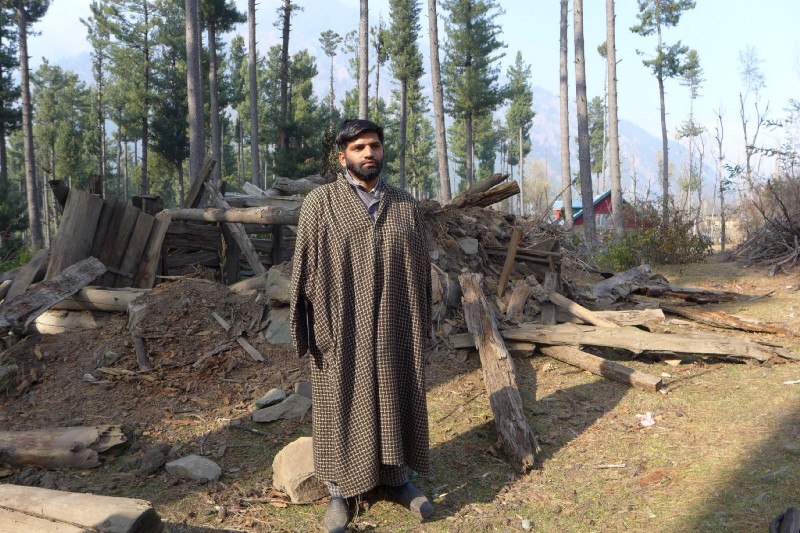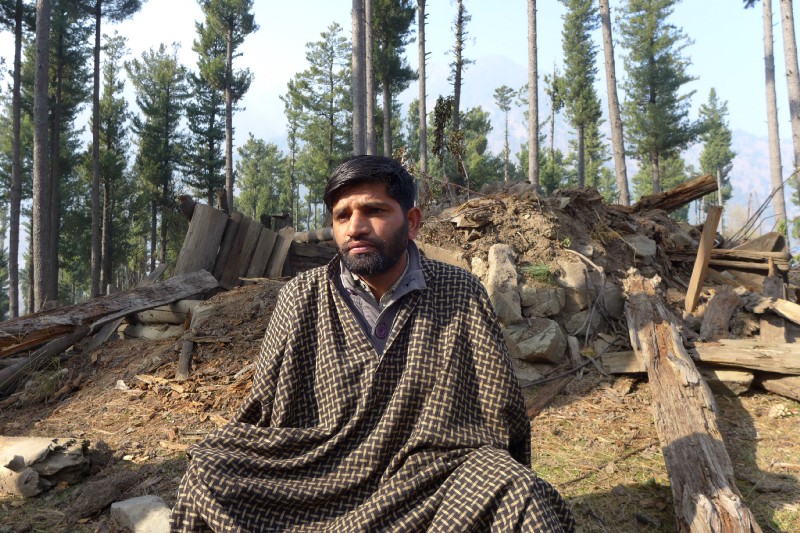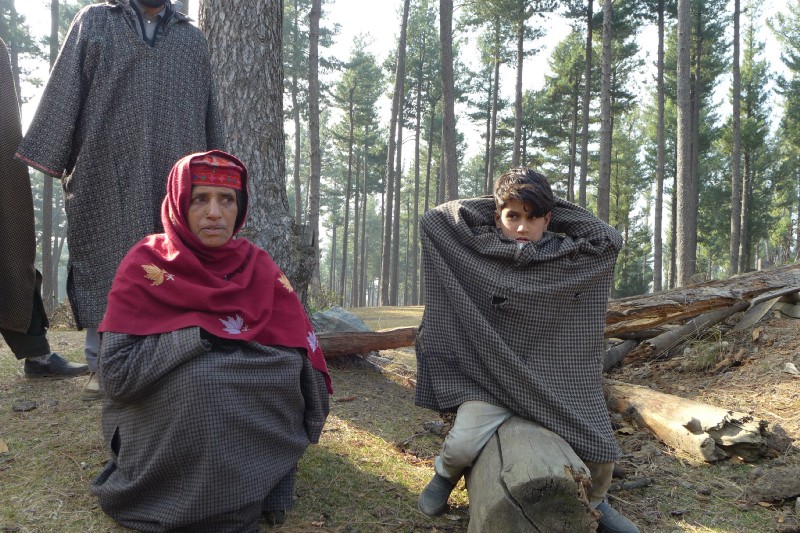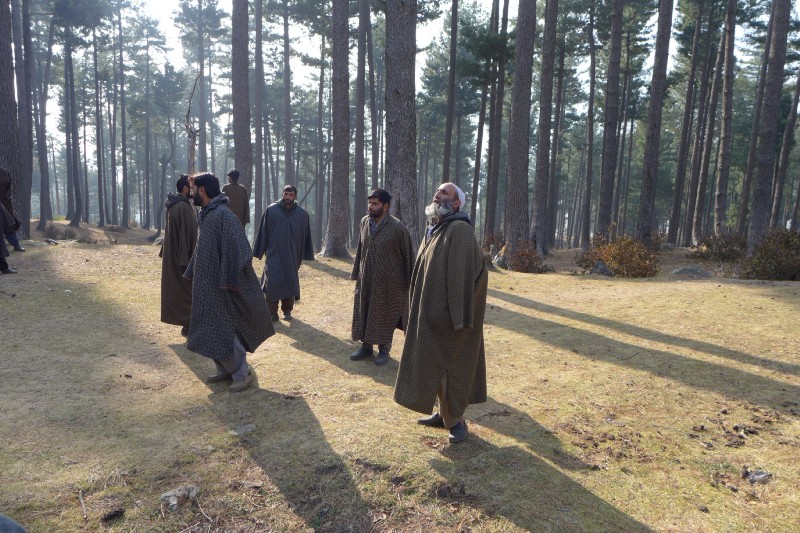
Abdul Aziz Khatana, 37, standing outside his demolished house in Lidora village in Pahalgam. (Photo: Stand with Kashmir)

Abdul Aziz Khatana, 37, standing outside his demolished house in Lidora village in Pahalgam. (Photo: Stand with Kashmir)
Tucked in the forests of the tourist hill station of Pahalgam, a few hours southeast of Kashmir’s capital, lies the village of Wangidaru-Lidoora. For decades, Abdul Aziz Khatana and his nomadic ancestors have called this picturesque place home. Except now, his home is gone. At the end of a curving mountain road, tall pines surround the mud huts dotting the steep Himalayan slopes. About 100 families from the Muslim nomadic people known as Gujjar- Bakerwals reside in the village. Two weeks ago, however, government officials demolished the huts of nine families, including Khatana’s.
Khatana and other villagers described their shock at witnessing more than 400 officials from multiple government agencies, including the Forest Department, arrive in the village with police and then raze the huts. Officials told the Gujjar community that they were being evicted from “illegally occupied forestlands,” villagers say. This move comes a year after the Indian government abrogated Article 370 of the Indian constitution, which gave exclusive citizenship rights to the permanent residents in Jammu and Kashmir and barred outsiders from buying property and land in the region. For a community living in poverty, now being told the forest is no longer their home, Khatana wonders: “Where will we go?”

Abdul Aziz Khatana, 37, outside his demolished house in Lidora village in Pahalgam. (Photo: Stand with Kashmir)
Under the constitution, Gujjars are considered a “Scheduled Tribe,” an official designation for the most underprivileged socioeconomic groups in India. In Kashmir, Gujjars largely earn their living by rearing cattle or working as woodcutters, while living in temporary shelters in the forests. As nomads, they move to warmer places twice a year to greener pastures with their cattle for grazing. The families live in kothas, or huts made of hay, wooden logs and mud. These huts remain abandoned in the harsh winters, when the Gujjars make their way south to Jammu for warmer climates. They walk for days or months together with their cattle and families. For many years, though, some nomadic families have given up this tradition of migration, preferring to stay put in Kashmir for the whole year. Their huts are located in forests across Kashmir. In Wangidaru, some Gujjar families say they’ve lived in the village for 70 years, if not longer.
Khatana’s great-grandfather first settled in the village. He says it’s also been home to his father who died two years ago at age 80, as well as his grandfather, who died at 100 several years back. These days, Khatana’s four children — ages eight to 14 — along with his brothers, uncles and mother live here. For decades, they have been left alone, and mostly stayed out of the conflict with Indian forces in Kashmir. Most of the men in Wangidaru rear cattle, or work as labourers and pony riders in Pahalgam, one of the top tourist destinations in Kashmir. They take visitors for a joy ride amid the peaks along the gushing Lidder River.

Bani Begum, mother of Aziz sitting at her village where the government is forcing the nomadic Muslim community out of their homes. (Photo Credit: Stand with Kashmir)
Fear is palpable in locals’ faces, as they recount how authorities “aggressively” demolished their homes and threatened them to leave soon. Community members say they’re feeling “powerless” and “voiceless” before the government’s oppression. After India stripped Kashmir of its autonomous state status last year, the central government in New Delhi has run the region as a “union territory.” Authorities have issued eviction notices to members of the Gujjar community and other forest-dwellers across many parts in the region. In Jammu, the nomadic families received written notices to vacate their homes. When hundreds of officials arrived in Wangidaru, all the village women gathered and pleaded for them to cease, trying to stop the demolition, according to Bani Begum, Khatana’s 70-year-old mother. Dressed in her traditional attire, a cap on her head wrapped with a woolen shawl, and pheran (a long robe worn by Kashmiris in winters), Begum says the officials “showed no mercy, they abused us,” she says.
Lacking land ownership and other resources, while struggling in poverty, Gujjar families say they’re left with few options. “This forest is our home,” Bani Begum says. “Our children are born here. Our elders are buried here. They are telling us to leave now. We will be forced to live on roads if this continues.”
People here are concerned for the nine families now left with no roof during Kashmir’s brutal winter. Snow has already started falling in the village and surrounding lands. Abdul Rasheed, another Wangidaru resident, worries the government might force them to leave the village at any moment. “They threatened us that they will throw us out,” says Rasheed, whose work as a ponywalla in Pahalgam has halted with the military clampdown following last year’s constitutional scrapping of Kashmir’s status. Rasheed believes his fellow Gujjars are being targeted because of their religion.
“This is only being done with us because we are Muslims. We do not understand if we have been living here and are born here where they want to send us now?” he asks. If this is the government’s new policy, “then they should also show us the way to which country we should go, whether we should go to China or Pakistan or any other country.”

After the abrogation of Kashmir’s limited autonomy last year, the region is now being federally governed. Authorities have implemented all of India’s central laws in the region. But they have yet to implement the Forest Rights Act 2006, which is applicable elsewhere in India. If applied, the act could provide Scheduled Tribe communities, such as the Gujjar community, with protection against evictions, and give them rights over the use of forestland for living and cultivation.
The forest rights law covers every Scheduled Tribe person who lives on forest land and whose livelihood is dependent on forests, which the Gujjar-Bakerwal community does. The regulation also applies to any non-Scheduled Tribe person or community living on forest land for three generations, or 75 years until December 13, 2005. In addition, India is a signatory to the UN Declaration on the Rights of Indigenous People, which urges member countries to recognize the rights of indigenous peoples. That includes the provision to protect rights to the “lands, territories and resources which they have traditionally owned, occupied and used.” With displacement concerns looming, the Gujjar community is demanding that the Forest Rights Act be implemented in Kashmir, so that they can remain in their homes.
Stand With Kashmir (SWK) is a Kashmiri diaspora-driven independent, transnational, grassroots movement committed to standing in solidarity with the people of Indian occupied Kashmir in ending the Indian occupation of their homeland and supporting the right to self-determination of the pre-partition state of Jammu and Kashmir. We want to hear from you. If you have general inquiries, suggestions, or concerns, please email us at info@standwithkashmir.org.
©2025 StandWithKashmir All rights reserved. SWK is a 501(c)(3) non-for-profit organization.
Leave a Reply